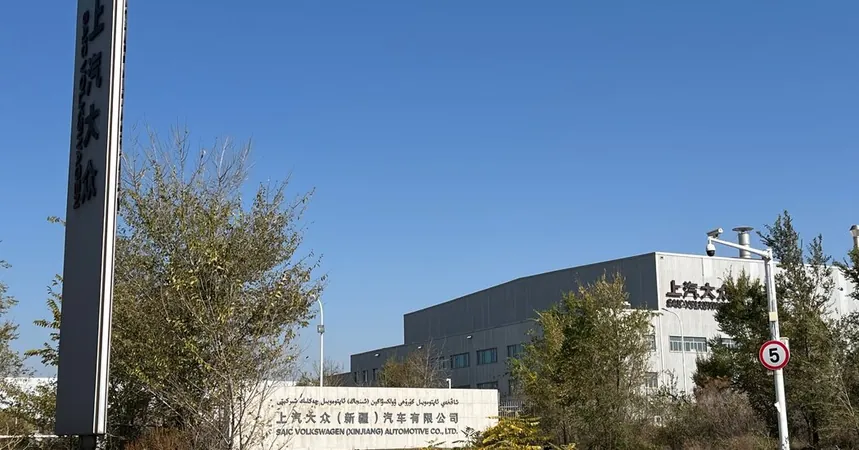
Volkswagen's Surprising Departure from Xinjiang: What It Means for the Future
2024-11-27
Author: Wai
Introduction
In a significant move, Volkswagen has announced its decision to completely divest its interests in the Xinjiang region of China after more than a decade of operations. This decision emerges against the backdrop of intense scrutiny over human rights abuses in the area, particularly concerning the treatment of predominantly Muslim ethnic groups such as the Uyghurs.
Volkswagen's Presence in Xinjiang
Volkswagen has long held a substantial foothold in Xinjiang, with a joint venture assembly plant located in Urumqi, the region's capital, alongside two test tracks. As the largest multinational presence in the area, Volkswagen faced mounting backlash from human rights organizations. Notably, both the United States and an increasing number of European nations have implemented restrictions on imports from Xinjiang due to credible allegations of forced labor.
The Implications of Volkswagen's Exit
Despite the Chinese government’s vigorous denial of these human rights claims and its pressures on global businesses to maintain operations in the region, Volkswagen’s exit signals a decisive break. This decision comes after BASF, another German giant, struggled for a year to divest its interests in Xinjiang, highlighting that even major corporations are reassessing their presence in areas of contention.
Business Considerations Behind the Decision
The rationale behind Volkswagen's move goes beyond ethical considerations; it is also a pragmatic business decision. The assembly plant in Urumqi has not been operational since 2019 and has proven to be a financial drain, primarily due to its reliance on gasoline-powered vehicles. China has witnessed a paradigm shift towards electric vehicles (EVs), which now account for about half of the automobile market. Competing manufacturer BYD has been particularly successful, overtaking Volkswagen in overall sales this year.
Logistical Challenges
Furthermore, the logistics of exporting vehicles from Urumqi have been less than ideal, given its significant distance from the coast and limited market demand from neighboring Central Asian countries. With only 175 workers currently engaged at the facility to prepare cars for delivery to western China, the plant is clearly not meeting its potential.
Volkswagen's Future Focus
As Volkswagen grapples with stiff competition from burgeoning Chinese automakers, it is pivoting its focus towards innovation in electric vehicles. The company announced plans to collaborate with its joint venture partner, SAIC Motor, to roll out at least eight new electric models by 2030. This strategic shift includes a massive investment in a new engineering facility in central China dedicated to EV development.
Human Rights Considerations
Despite Volkswagen’s attempts to maintain a positive workforce dynamic by employing local Uyghurs in the past, the tightening grip of Chinese authorities on the region has led to severe repercussions for the local population. Since 2014, the Chinese government has escalated its campaign against the Uyghurs and other ethnic minorities, leading to mass detentions and forced labor programs, drawing international condemnation.
Conclusion
Volkswagen has vehemently denied any allegations of involvement in forced labor during the construction of its test track but faced scrutiny over an internal audit that was criticized for failing to adequately protect worker privacy. As the automotive landscape continues to evolve and public pressure mounts over ethical production practices, Volkswagen’s exit from Xinjiang underscores the complex interplay between market dynamics and moral responsibilities in the global economy. The future remains uncertain for companies operating in contentious regions, but one thing is clear: the repercussions of human rights issues are now resonating widely throughout the corporate world, compelling a reevaluation of business strategies.


 Brasil (PT)
Brasil (PT)
 Canada (EN)
Canada (EN)
 Chile (ES)
Chile (ES)
 España (ES)
España (ES)
 France (FR)
France (FR)
 Hong Kong (EN)
Hong Kong (EN)
 Italia (IT)
Italia (IT)
 日本 (JA)
日本 (JA)
 Magyarország (HU)
Magyarország (HU)
 Norge (NO)
Norge (NO)
 Polska (PL)
Polska (PL)
 Schweiz (DE)
Schweiz (DE)
 Singapore (EN)
Singapore (EN)
 Sverige (SV)
Sverige (SV)
 Suomi (FI)
Suomi (FI)
 Türkiye (TR)
Türkiye (TR)